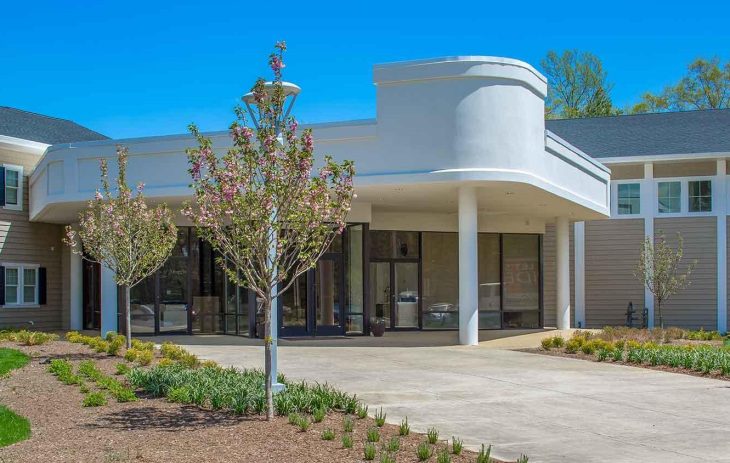About Recovery Centers of America Capital Region
Recovery Centers of America has many locations, including one right outside the Capital Beltway on Billingsley Road in Waldorf, Maryland. They treat substance use and co-occurring mental health disorders. You can go to inpatient and outpatient treatments, and they have an inpatient medical detox program that lasts usually between 20-35 days.
The programs accept most major insurance carriers as an in network provider. They’ll also work with your insurance if you’re out of network.
The detox program lasts 5-7 days and is medically supervised around the clock. During detox, you can experience uncomfortable withdrawal symptoms such as gastric distress, nausea, vomiting, and insomnia. During detox, they’ll give you medications to help ease any of these withdrawal symptoms.
Everyone’s detox is different, depending on the substances you’ve been using and how long you’ve been using them. Some people only need a few days while others may take a week or longer to detox. Detox is an important first step because this is where you’ll break your body’s physical dependence on the substances. Detox builds a strong foundation for your sober journey.
While in detox, you’ll also start group and individual therapy. You and your treatment team will work on identifying any co-occurring mental health disorders you may have. A co-occurring disorder is a mental health issue like depression, anxiety, or bipolar disorder. If appropriate, you’ll get medication management for co-occurring disorders.
There are also some nice amenities at the facility. There’s a recreational center and gym with a fitness instructor. You can take advantage of cooking classes where you’ll learn about proper nutrition. There’s a wellness spa onsite, and you can attend recovery music and creative arts programs. They’re also pretty close to Virginia and Washington D.C., and outdoor excursions may be possible.
For most people, detox is the first step in their inpatient treatment program. They also have outpatient programs if you can’t commit to the full inpatient program. The outpatient programs are also a great step down for continued support after completing the inpatient program.
Levels of Care
-
Inpatient
Inpatient and residential programs provide round-the-clock medical and emotional support as you live at the treatment facility. This level of care may be recommended if you have severe addictions or mental health conditions since it removes outside distractions and allows you to focus solely on therapy.
-
Aftercare
Aftercare programs provide ongoing support after you complete a rehab program. They may include several components to help you maintain sobriety including therapy, community support groups and relapse prevention strategies. This gives you a network of resources as you reintegrate into your daily life.
-
Dual Diagnosis
Dual diagnosis programs address substance use disorders and co-occurring mental health conditions simultaneously. This integrated approach to care improves the likelihood of long term recovery and stability by addressing the root causes of addiction.
Detox Service Setting
-
Inpatient Detox
Inpatient detox occurs in a dedicated treatment facility. You’ll live there around the clock and receive intensive medical support and supervision to help manage your withdrawal symptoms. It is suitable for individuals with moderate to severe addictions as it ensures a stable detox environment.
Programs
-
Adult (18+)
Adult programs address the substance use and life challenges specific to adults. Therapists can deliver sessions in individual, group and family settings. Services often include job support and life skills training in a structured environment.
-
Alcohol Detox
Alcohol detox programs offer medical support to help individuals withdraw safely from alcohol. Your care team may use medications to ease your symptoms and provide medical monitoring to address complications.
-
Cognitive Behavioral Therapy
Cognitive behavioral therapy focuses on changing harmful thought patterns and behaviors associated with addiction. You’ll learn healthier coping mechanisms by identifying and replacing negative thoughts. This improves your emotional resilience and decreases your relapse potential.
-
Exercise Therapy
Exercise therapy incorporates physical activity into treatment to promote mental and physical health. Regular exercise reduces stress, boosts mood and enhances your overall wellbeing. This can give you a positive outlook and lower your relapse risk.
-
Men
Men's programs address substance use while also considering the social pressures, family roles and mental health concerns that are specific to men. You’ll learn healthy coping mechanisms as you build emotional resilience and develop communication skills.
-
Opioid Detox
Opioid detox uses medications to ease severe withdrawal symptoms. It also includes medical supervision to help you manage potential complications. These services allow you to stabilize and begin a recovery plan.
-
Women
Women's programs offer a safe and supportive space to focus on gender specific issues such as trauma, family roles and mental health conditions. Therapists tailor the sessions to address women's needs and foster empowerment in a healing and nurturing environment.
-
Young Adult (18 - 25)
Young adult programs are designed for individuals who are transitioning into adulthood. Topics of discussion typically include identity, independence and peer relationships. Providers may also offer life skills training and career support.
Payment Options
- Private Insurance
- Self Pay
Accreditations
-
 NAATP
NAATP
-
 Joint Commission
Joint Commission
Amenities
- Fitness Center
- Music Room
- Yoga Studio
Contact
11100 Billingsley Road
Waldorf, MD 20602





